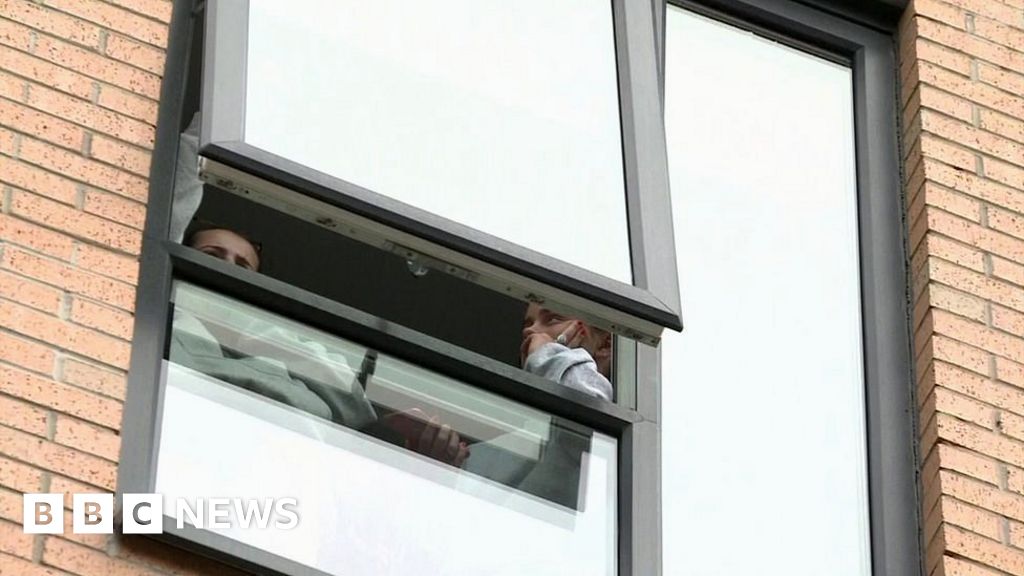 Image copyright
PA Media
Image copyright
PA Media
England's exams regulator, Ofqual, says it warned the government of the risk of widespread dissatisfaction with its emergency grading system.
Chairman Roger Taylor told MPs there were good reasons to attempt it, including fairness between schools and continuity from year to year.
But he said other options could have been used, such as delaying exams or using school-issued certificates.
Many A-levels were downgraded after schools' estimates were standardised.
After problems emerged with this moderation process, A-level and GCSE grades were withdrawn in a last-minute U-turn, causing chaos in university and college admissions and confusion for students.
Instead results were based on estimates submitted by schools - and Ofqual's chief regulator, Sally Collier, resigned.
'Valid mock?'
Mr Taylor, who was giving evidence to the Commons Education Select Committee, defended Ofqual's approach, saying it was trying to carry out ministerial guidelines.
He argued that using a standardised model was advantageous to disadvantaged pupils on the whole.
The Ofqual chairman told MPs that he and other officials repeatedly stressed that the Department for Education were warned repeatedly of risks in the system.
Julie Swann, Ofqual's executive director for general qualifications, said a paper on May 1 "highlighted the risk of widespread dissatisfaction" with the grades to be awarded from students, schools and colleges.
Mr Taylor, also revealed Ofqual guidance on using "valid mock" exam results to widen the appeals process, was removed from the Ofqual website after an intervention from England's education secretary.
Mr Williamson had decided to allow what he described as "valid mocks" to be used in appeals, after a standardisation process - using a now discredited algorithm that had lowered around 40% of A-levels from the grades submitted by teachers.
Mr Taylor said Mr Williamson telephoned the chief regulator, Sally Collier, late on a Saturday night, August 15, after Ofqual published new appeals guidance, saying it was not consistent with the education secretary's policy.
Ofqual had been trying to formulate a way for such appeals to work, while meeting its statutory duty to ensure exams were fair.
Mr Taylor said the board then met in emergency session to try to find a way through a situation which was rapidly "spinning out of control".
"We advised the Secretary of State at this point that we could not be confident that this could be delivered within the statutory duties of Ofqual to ensure that valid and trustworthy grades were being issued."
'Exams U-turn'
Discussions followed throughout Sunday, in which it became clear that a move to "centre assessed grades", which had been submitted by schools and colleges, was all but inevitable.
Mr Williamson went on to announce that results would use these centre assessed grades in a major U-turn.
The Ofqual chairman told MPs they had been consulted by the Department for Education on the implications of cancelling exams back in March.
At this point, Ofqual said there were four options:
to delay exams until the virus crisis passed conduct socially distanced exams use some form of teacher and school-assessed certificates or to combine school-based assessments with the standardisation model that was eventually used.Mr Taylor said Mr Williamson made the announcement that exams were being cancelled without coming back to Ofqual.
The committee heard Ofqual had been concerned that many students would be upset with their grades, as they had not sat any examination and the regulator thought it would be very difficult to win public support for the replacements.
'Mutant algorithm?'
On the algorithm used for grades, this was developed by Ofqual working with technical experts from the exam boards/
When asked when it "mutated" by committee member Ian Mearns, in reference to prime ministers Boris Johnson's description of it to students last week, Ms Swan said it had not.
Mr Taylor insisted standardisation via the algorithm was fairer to candidates from disadvantaged backgrounds, and his officials said its accuracy had been shown to be 90% in testing.
He added: "Once the decision has been taken to cancel exams, it's very difficult to find a solution."

 5 years ago
1188
5 years ago
1188 
